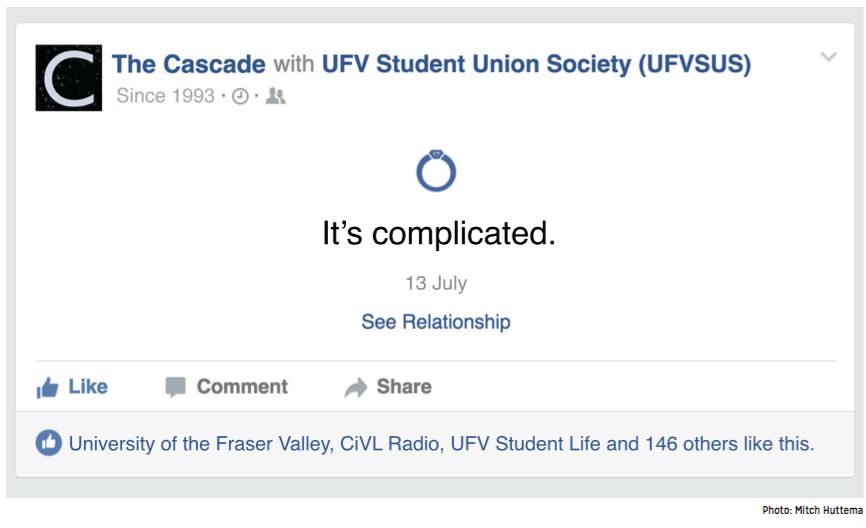By Alex Rake (The Cascade) – Email

The entire time that I have been involved with The Cascade, the paper has not had a good relationship with the Student Union Society (SUS). There are inside jokes and paranoia on both sides, and this reflects blatantly in both SUS coverage in the paper and discussion of The Cascade in SUS announcements and meetings.
This is unfair to students affiliated with neither organization, and I feel the need to discuss the issue as I leave this paper and this university for the real world, so that both organizations can figure out their problems, and so that the student public can be aware of the useless tension.
The fault is nobody’s, exactly; fault pingpongs back and forth. There have been Cascade articles that ridiculously misquote SUS officials (terrible journalism). There have been statements from SUS emailed to every single student (propaganda) about how certain Cascade articles hurt more than they help (e.g., last semester’s report on sexual assault on campus).
SUS has, at times, even gone so far as to refuse interviews on the basis that they cannot trust The Cascade to reflect their organization accurately. And many Cascaders, myself included, have at times interpreted this as a way of controlling their image by preventing “bad PR.” This cannot happen if student journalism is to continue to do its job.
Journalism keeps power in check, not only by calling out abuses of power but by informing the public what banal things that power is up to. Without this so-called “watchdog” function, newspapers are just stacks of ads and slice-of-life community stories.
SUS is one such power that needs to be kept in check. They can make changes to fees, clubs, and the ways it represents students. The student public needs to be aware of the whys and wherefores of such decisions in order to make an informed vote, inquiry, or protest. In order to get a balanced representation of the pros and cons of any of these decisions, it is The Cascade’s job to present SUS’s view of such decisions, the views of those that agree, and the views of those that disagree. The paper needs to conduct real, face-to-face interviews.
An email interview, which SUS has sometimes preferred, is not a good interview. Not only does it mean potential delays between question and answer, and therefore allows the interviewee to come up with avoidant, PR-soaked answers, but the answers might not show up in the interviewer’s inbox at all, or at least not on time. Whenever possible, a real-time, in-person interview is ideal. This puts powers like SUS in the hotseat, of course, but the existence of live voice recordings is the best defense against misquoting because it includes tone and context. Find yourself quoted irresponsibly? Refer to the recording and embarrass the pants off the writer!
It’s also important to remember that in both organizations, nobody really knows what they’re doing, especially not when they’re starting out. The members recycle every couple years, new problems arise, and old solutions are forgotten. Another function of good student journalism is to record these problems and how they were resolved, which can’t happen if the journalists aren’t allowed to question SUS. But SUS won’t want to talk to The Cascade if they continue to conduct shoddy journalism, full of misquotation, anti-SUS framing, and sensationalized headlining.
I experienced this headlining problem firsthand as a wee baby staff writer at The Cascade. I wrote an article reporting, very plainly, the facts about some funding that was given to trades programs at UFV, additional funding that arts programs happened not to be receiving. My editor tacked it with a headline along the lines of “Trading creativity for carpentry,” implying a philosophical position that I personally disagree with. But it was published that way without my knowledge, and many trades professors declined to do interviews with me from then on. It was an example of an individual dropping the balanced-journalism ball, simply because they did not know not to do that.
This lack of expertise exists equally within SUS. Budgets and minutes were often not accessible online in a timely manner in the past year, making straightforward research difficult. When SUS officials would not elaborate when asked for specifics about these kinds of documents, it was, to a journalist’s senses, suspicious — even if there was no conspiracy going on. All SUS needs to assuage prying, suspicious journalists is (or ought to be) plain old information. This is what I, at least, meant when I talked about the need for “transparency” in my opinion articles during the SUS elections.
Cascade: Conduct endless interviews. Draw well-informed conclusions. Write balanced articles.
SUS: Understand that you have power. Accept the role of student journalism as something good for the students you represent. Avoid keeping secrets.
The next year is a new era for both SUS and The Cascade, both organizations under brand-new leadership. SUS president Sukhi Brar and Cascade editor-in-chief Vanessa Broadbent are both human beings I respect and trust on a personal level. On an organizational level, only time will tell if we can trust them to reverse the inertia of their organizations’ biases, for the benefit of their impressionable new employees and the information-hungry UFV student body.

